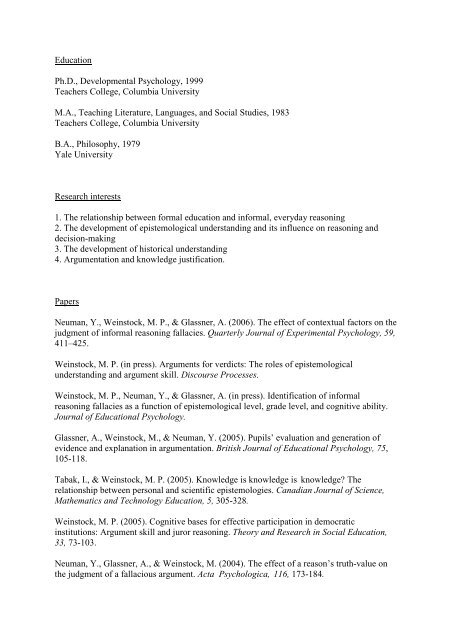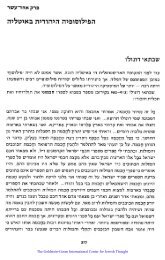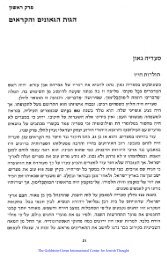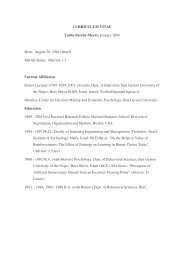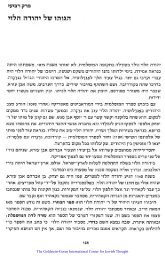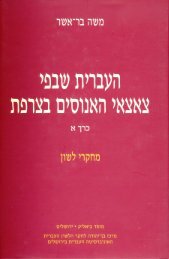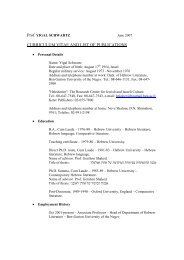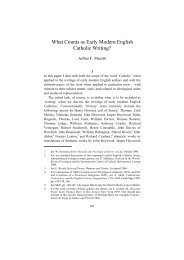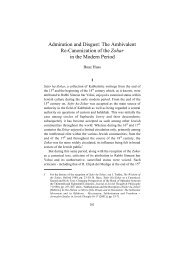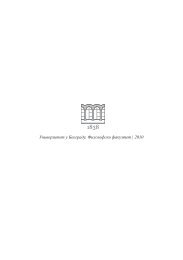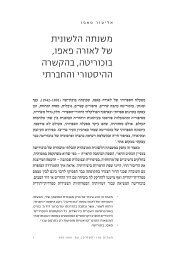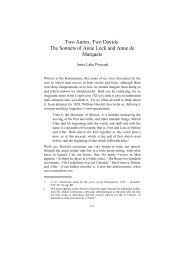Michael Weinstock CV and Publication List
Michael Weinstock CV and Publication List
Michael Weinstock CV and Publication List
- No tags were found...
You also want an ePaper? Increase the reach of your titles
YUMPU automatically turns print PDFs into web optimized ePapers that Google loves.
EducationPh.D., Developmental Psychology, 1999Teachers College, Columbia UniversityM.A., Teaching Literature, Languages, <strong>and</strong> Social Studies, 1983Teachers College, Columbia UniversityB.A., Philosophy, 1979Yale UniversityResearch interests1. The relationship between formal education <strong>and</strong> informal, everyday reasoning2. The development of epistemological underst<strong>and</strong>ing <strong>and</strong> its influence on reasoning <strong>and</strong>decision-making3. The development of historical underst<strong>and</strong>ing4. Argumentation <strong>and</strong> knowledge justification.PapersNeuman, Y., <strong>Weinstock</strong>, M. P., & Glassner, A. (2006). The effect of contextual factors on thejudgment of informal reasoning fallacies. Quarterly Journal of Experimental Psychology, 59,411–425.<strong>Weinstock</strong>, M. P. (in press). Arguments for verdicts: The roles of epistemologicalunderst<strong>and</strong>ing <strong>and</strong> argument skill. Discourse Processes.<strong>Weinstock</strong>, M. P., Neuman, Y., & Glassner, A. (in press). Identification of informalreasoning fallacies as a function of epistemological level, grade level, <strong>and</strong> cognitive ability.Journal of Educational Psychology.Glassner, A., <strong>Weinstock</strong>, M., & Neuman, Y. (2005). Pupils’ evaluation <strong>and</strong> generation ofevidence <strong>and</strong> explanation in argumentation. British Journal of Educational Psychology, 75,105-118.Tabak, I., & <strong>Weinstock</strong>, M. P. (2005). Knowledge is knowledge is knowledge? Therelationship between personal <strong>and</strong> scientific epistemologies. Canadian Journal of Science,Mathematics <strong>and</strong> Technology Education, 5, 305-328.<strong>Weinstock</strong>, M. P. (2005). Cognitive bases for effective participation in democraticinstitutions: Argument skill <strong>and</strong> juror reasoning. Theory <strong>and</strong> Research in Social Education,33, 73-103.Neuman, Y., Glassner, A., & <strong>Weinstock</strong>, M. (2004). The effect of a reason’s truth-value onthe judgment of a fallacious argument. Acta Psychologica, 116, 173-184.
<strong>Weinstock</strong>, M., & Flaton, R. A. (2004). Evidence coverage <strong>and</strong> juror-reasoning skill asmediating factors in a juror’s verdict choice. Journal of Behavioral Decision Making, 17,191-212.<strong>Weinstock</strong>, M., Neuman, Y., & Tabak, I. (2004). Missing the point or missing the norms?Epistemological norms as predictors of students’ ability to identify fallacious arguments.Contemporary Educational Psychology, 29, 77-94.<strong>Weinstock</strong>, M., & Cronin, M. A. (2003). The everyday production of knowledge: Individualdifferences in epistemological underst<strong>and</strong>ing <strong>and</strong> juror reasoning skill. Applied CognitivePsychology, 17, 161-181.Kuhn, D., Cheney, R., & <strong>Weinstock</strong>, M. (2000). The development of epistemologicalunderst<strong>and</strong>ing. Cognitive Development, 15, 309-328.Kuhn, D., <strong>Weinstock</strong>, M., & Flaton, R. (1994). How well do jurors reason?: Competencedimensions of the individual variation in a juror reasoning task. Psychological Science, 5(5),289-296.Book ChaptersKuhn, D., & <strong>Weinstock</strong>, M. (2002). What is epistemological thinking <strong>and</strong> why does it matter?In B. Hofer & P. Pintrich (Eds.), Personal epistemology: The psychology of beliefs aboutknowledge <strong>and</strong> knowing (pp. 121-144). Mahwah NJ: Lawrence Erlbaum Associates.Kuhn, D., <strong>Weinstock</strong>, M., & Flaton, R. (1994). Historical reasoning as theory-evidencecoordination. In M. Carretero & J. F. Voss (Eds.), Cognitive <strong>and</strong> instructional processes inhistory <strong>and</strong> the social sciences (pp. 377-401). Hillsdale, NJ: Lawrence ErlbaumAssociates.


